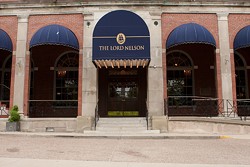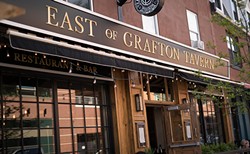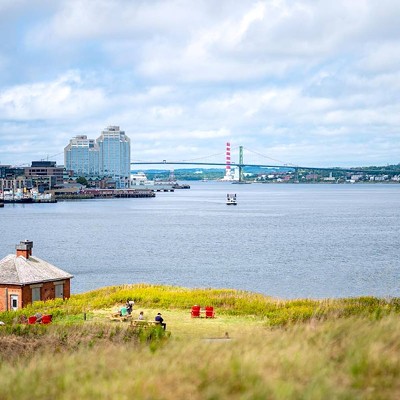Halifax’s largest catering and tourism groups have laid off almost all staff this summer
Despite the re-opening on June 5, hundreds of staff in the restaurant, catering and tourism industries remain unemployed.
[
{
"name": "Air - Inline Content - Upper",
"component": "26908817",
"insertPoint": "1/4",
"requiredCountToDisplay": "8"
},{
"name": "Air - Inline Content - Middle",
"component": "26908818",
"insertPoint": "1/2",
"requiredCountToDisplay": "8"
},{
"name": "Air - Inline Content - Lower",
"component": "26908819",
"insertPoint": "100",
"requiredCountToDisplay": "1"
}
]
H
alifax’s economy is taking a hard hit with COVID-19 and the effects are still setting in. Although restaurants, bars and events spaces have begun to re-open, that doesn’t mean everyone is back to work.
“I wouldn’t necessarily say that the 50 percent capacity has affected us as much as the fact that there’s no tourists, there’s no travel, there’s nobody in hotels,” says Shannon Bruhm, President of RCR Hospitality Group, which owns seven restaurants across Halifax.
Bruhm says while three of his restaurants re-opened June 5 (Waterfront Warehouse, East of Grafton and the Agricola Street Brasserie), he wanted to wait and test the waters before re-opening the full fleet.
RCR re-opened Cut Steakhouse and Shuck Seafood, both on Lower Water Street, on June 19. RCR also owns The Arms Pub inside The Lord Nelson Hotel, which laid of most staff, retaining a skeleton crew of six people throughout the pandemic.
“We had to provide room service here at The Lord Nelson so we kept a couple of our chefs and a couple of staff on to take take-out orders and do room service,” says Bruhm.
The Arms remains closed to the public, and Bistro le Coq on Argyle Street has also yet to re-open. “I’m not sure what we’ll do with the Bistro location, cause we have two right side by side there, East of Grafton and Bistro are side by side, so I’m not sure if we’ll bother opening that one quite yet,” says Bruhm.
In total, only about 50 people have been re-hired of the 250 who were working before the pandemic. At the peak of a typical Halifax tourist season, Bruhm says RCR would employ about 350 people.
Many of those seasonal employees would work for RCR’s catering businesses, serving events at the Cunard Centre, Pier 21, the Discovery Centre and the Lord Nelson.
It’s that side of the business that’s taken the biggest hit. “Our catering operations is more than 50 percent of our business, so we are fundamentally at a much lower rate of re-hire than probably if we were just running restaurants,” says Bruhm.
Another large restaurant-tourism company in Halifax, Murphy’s Cable Wharf, is in a similar situation. The 385-person waterfront restaurant is owned by Ambassatours, and typically takes group reservations from cruise ship passengers and tourists.
“We do a lot of group tours, groups come in to do lobster, and people come down for chowder, lobster dinners and that thing,” says Ambassatours communication manager Terri McCulloch.
But the main part of Ambassatours that’s shut down isn’t the restaurant, which will re-open July 1, it's the bus trips to Peggy’s Cove and the Annapolis Valley that have been cancelled, and the capacity on their vessels like the Tall Ship Silva and steam wheeler is limited to about 30 percent.
“We normally would have about 500 staff in peak season and we’ll be nowhere near that this year. We’ll be probably more in the 100 range,” says McCulloch.
Ambassatours is used to managing 8,000 people a day coming off cruise ships. McCulloch says they typically have 170 tour guides and ticket sellers. “I have people who just manage lineups and make sure people get on the right bus. So unfortunately, those seasonal positions anyway, we’re not able to re-offer to those staff for this year,” says McCulloch.
According to Statistics Canada, in 2019 there were over 35,8000 people employed in accommodations and food services in Nova Scotia. Data from a 2020 Q1 Restaurants Canada survey says 80 percent of food service operators laid off staff in March due to COVID, and more than half of restaurants shut down entirely, laying off 800,000 workers across Canada.
The Restaurant Association of Nova Scotia says there’s no official data on the issue within the province, but it’s expected not everyone in the industry will be working this summer.
"There will be less seasonal employment in the restaurant sector as there isn’t sufficient sales to justify hiring back existing staff, and they will be hired first,” says Natasha Chestnut, Marketing Administrator for RANS.
For RCR, Bruhm says places like the Waterfront Warehouse are operating at about 20 or 30 percent capacity, despite the 50 percent limitation from government.
“You can tell when you’re down on the waterfront walking around, there’s people around but it’s not the bustling, busy amount of people that are generally downtown right now,” he says.
The restaurant group is hemorrhaging money right now just paying the staff they do have. “We’re arranging financing, significant financing to pay our bills from before we closed, to pay our people even though there’s not as much money coming in. We still have rent on all our properties to pay,” he says. “You do what you have to do to exist and keep living and so we’re doing that.”
But Bruhm also worries not all his employees will want to come back to their jobs after they’ve seen the benefits of Universal Basic Income in the form of CERB.
Someone making minimum wage of $12.55 an hour in Nova Scotia—as many in the restaurant and tourism industry do—would need to work 40 hours a week to make $2,008 a month before taxes are taken off the top, as well as any uniform fees, union dues, sick days or missed shifts. CERB pays a flat $2,000 every four weeks, although taxes on the income will need to be repaid next tax season.
“I think the CERB has made it difficult, especially now that it’s summer,” he says. “If you’re a 20-some-year-old kid without much experience and someone’s paying you a couple thousand dollars a month to hang out at the beaches and the beer gardens, you’ll be hard-pressed to find, to get all your people back.”
And Bruhm doesn't blame them. Even if RCR hired back all their staff, they likely wouldn't bring in as much as usual this summer. Bruhm says the company didn't apply for the 75 percent federal wage subsidy, CEWS, because with restaurants closed or operating on a smaller scale, they didn't have work to offer.
"Summer used to be peak business levels, and paying OT was often the case, especially for kitchen workers," says Bruhm. Those days are probably gone now too. If you’re a server and depending on tips if there are fewer people, and restaurants are social distanced, it stands to reason tips might be down as well," says Bruhm.
Above everything, RCR's continued re-hiring of staff depends on public health, and whether Nova Scotia has more outbreaks of COVID-19 in the coming months.
“If things continue to improve we’ll continue to hire people back,” he says. “But if we get this second wave everybody’s talking about and they have to restrict things more, then we’ll have to let people go again. “So, it’s hard to tell exactly what’s going to happen.”
alifax’s economy is taking a hard hit with COVID-19 and the effects are still setting in. Although restaurants, bars and events spaces have begun to re-open, that doesn’t mean everyone is back to work.
“I wouldn’t necessarily say that the 50 percent capacity has affected us as much as the fact that there’s no tourists, there’s no travel, there’s nobody in hotels,” says Shannon Bruhm, President of RCR Hospitality Group, which owns seven restaurants across Halifax.
Bruhm says while three of his restaurants re-opened June 5 (Waterfront Warehouse, East of Grafton and the Agricola Street Brasserie), he wanted to wait and test the waters before re-opening the full fleet.
RCR re-opened Cut Steakhouse and Shuck Seafood, both on Lower Water Street, on June 19. RCR also owns The Arms Pub inside The Lord Nelson Hotel, which laid of most staff, retaining a skeleton crew of six people throughout the pandemic.
“We had to provide room service here at The Lord Nelson so we kept a couple of our chefs and a couple of staff on to take take-out orders and do room service,” says Bruhm.
The Arms remains closed to the public, and Bistro le Coq on Argyle Street has also yet to re-open. “I’m not sure what we’ll do with the Bistro location, cause we have two right side by side there, East of Grafton and Bistro are side by side, so I’m not sure if we’ll bother opening that one quite yet,” says Bruhm.
In total, only about 50 people have been re-hired of the 250 who were working before the pandemic. At the peak of a typical Halifax tourist season, Bruhm says RCR would employ about 350 people.
Many of those seasonal employees would work for RCR’s catering businesses, serving events at the Cunard Centre, Pier 21, the Discovery Centre and the Lord Nelson.
It’s that side of the business that’s taken the biggest hit. “Our catering operations is more than 50 percent of our business, so we are fundamentally at a much lower rate of re-hire than probably if we were just running restaurants,” says Bruhm.
Another large restaurant-tourism company in Halifax, Murphy’s Cable Wharf, is in a similar situation. The 385-person waterfront restaurant is owned by Ambassatours, and typically takes group reservations from cruise ship passengers and tourists.
“We do a lot of group tours, groups come in to do lobster, and people come down for chowder, lobster dinners and that thing,” says Ambassatours communication manager Terri McCulloch.
But the main part of Ambassatours that’s shut down isn’t the restaurant, which will re-open July 1, it's the bus trips to Peggy’s Cove and the Annapolis Valley that have been cancelled, and the capacity on their vessels like the Tall Ship Silva and steam wheeler is limited to about 30 percent.
“We normally would have about 500 staff in peak season and we’ll be nowhere near that this year. We’ll be probably more in the 100 range,” says McCulloch.
Ambassatours is used to managing 8,000 people a day coming off cruise ships. McCulloch says they typically have 170 tour guides and ticket sellers. “I have people who just manage lineups and make sure people get on the right bus. So unfortunately, those seasonal positions anyway, we’re not able to re-offer to those staff for this year,” says McCulloch.
According to Statistics Canada, in 2019 there were over 35,8000 people employed in accommodations and food services in Nova Scotia. Data from a 2020 Q1 Restaurants Canada survey says 80 percent of food service operators laid off staff in March due to COVID, and more than half of restaurants shut down entirely, laying off 800,000 workers across Canada.
The Restaurant Association of Nova Scotia says there’s no official data on the issue within the province, but it’s expected not everyone in the industry will be working this summer.
"There will be less seasonal employment in the restaurant sector as there isn’t sufficient sales to justify hiring back existing staff, and they will be hired first,” says Natasha Chestnut, Marketing Administrator for RANS.
For RCR, Bruhm says places like the Waterfront Warehouse are operating at about 20 or 30 percent capacity, despite the 50 percent limitation from government.
“You can tell when you’re down on the waterfront walking around, there’s people around but it’s not the bustling, busy amount of people that are generally downtown right now,” he says.
The restaurant group is hemorrhaging money right now just paying the staff they do have. “We’re arranging financing, significant financing to pay our bills from before we closed, to pay our people even though there’s not as much money coming in. We still have rent on all our properties to pay,” he says. “You do what you have to do to exist and keep living and so we’re doing that.”
But Bruhm also worries not all his employees will want to come back to their jobs after they’ve seen the benefits of Universal Basic Income in the form of CERB.
Someone making minimum wage of $12.55 an hour in Nova Scotia—as many in the restaurant and tourism industry do—would need to work 40 hours a week to make $2,008 a month before taxes are taken off the top, as well as any uniform fees, union dues, sick days or missed shifts. CERB pays a flat $2,000 every four weeks, although taxes on the income will need to be repaid next tax season.
“I think the CERB has made it difficult, especially now that it’s summer,” he says. “If you’re a 20-some-year-old kid without much experience and someone’s paying you a couple thousand dollars a month to hang out at the beaches and the beer gardens, you’ll be hard-pressed to find, to get all your people back.”
And Bruhm doesn't blame them. Even if RCR hired back all their staff, they likely wouldn't bring in as much as usual this summer. Bruhm says the company didn't apply for the 75 percent federal wage subsidy, CEWS, because with restaurants closed or operating on a smaller scale, they didn't have work to offer.
"Summer used to be peak business levels, and paying OT was often the case, especially for kitchen workers," says Bruhm. Those days are probably gone now too. If you’re a server and depending on tips if there are fewer people, and restaurants are social distanced, it stands to reason tips might be down as well," says Bruhm.
Above everything, RCR's continued re-hiring of staff depends on public health, and whether Nova Scotia has more outbreaks of COVID-19 in the coming months.
“If things continue to improve we’ll continue to hire people back,” he says. “But if we get this second wave everybody’s talking about and they have to restrict things more, then we’ll have to let people go again. “So, it’s hard to tell exactly what’s going to happen.”




















